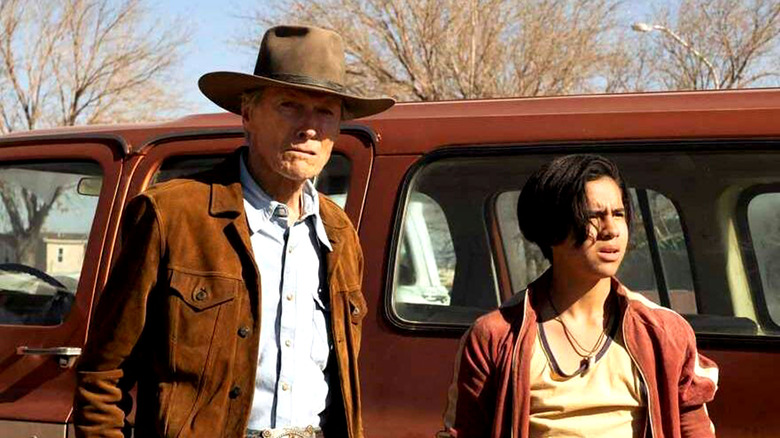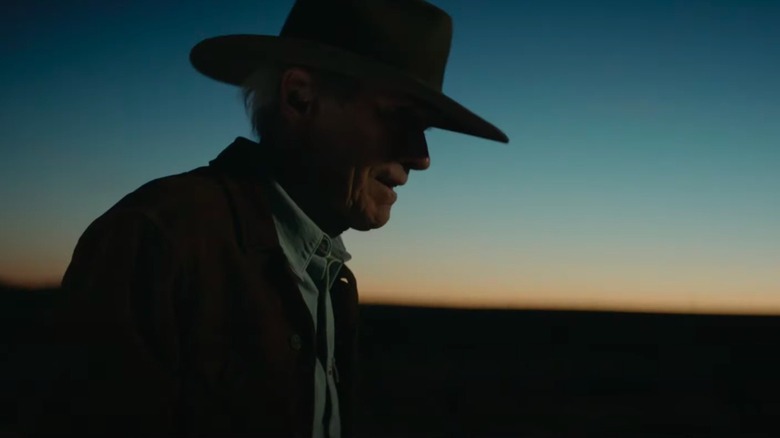Cry Macho Review: Clint Eastwood Rides Again In This Old-Fashioned Cowboy Drama
It's been nearly 30 years since "Unforgiven," which remains Clint Eastwood's directorial masterpiece, and each year is apparent on Eastwood's craggy face in his latest effort, "Cry Macho." In some respects, "Cry Macho" is as reminiscent of that seminal Western as it is another Eastwood hit, "Gran Torino." In that 2008 drama, Eastwood was paired with a young actor, balancing his taciturn elder-statesman status with someone from an entirely different generation. But "Gran Torino" was also an absurd, offensive polemic of an effort. "Cry Macho" is as terse and cut to the bone as some of Eastwood's later films as director, but mercifully a lot more tolerable than many of his recent features. Clint Eastwood may well have more films in him as either director or actor, but if "Cry Macho" ends up being his genuine swan song, he could do worse.
Based on the novel of the same name by N. Richard Nash, "Cry Macho" features Eastwood as Mike Milo, a fallen rodeo star who drowned himself in booze and pills, a character description helpfully summed up with nastiness in the first scene by Mike's grouchy boss Howard (Dwight Yoakam), who promptly fires Mike. A year later, Howard approaches Mike with a much different request: he wants Mike to travel to Mexico and bring his teenage son Rafo (Eduardo Minett) home to him on his massive ranch. Quickly, Mike realizes that Rafo is a wild child, or as his mother dubs him, a "monster". Rafo is found at an illegal cockfighting ring with his rooster Macho, but he soon warms to Mike and seems willing to travel across the border to live the life of a cowboy.
Anyone with more than a passing familiarity with some of Clint Eastwood's most recent films, such as The 15:17 to Paris and The Mule, will understand that to watch these films is to both be burdened with questions of logic and accept that questions of logic are not welcome. Does it make much sense that Howard would call upon Mike to rescue his son (or kidnap him, depending on how you look at it) a year after insulting him for having been a boozehound and drug addict? Does it make much sense that a teenage boy with a wild streak would willingly go with a strange old man upon learning that he's a cowboy (or that he simply says he is)? And of course there's the most unavoidable matter of all, which is that Clint Eastwood, screen legend for decades, is now 91 years old and looking every day of it. (Fair is fair: he filmed "Cry Macho" in late 2020, when he was 90.) Learning that Mike is a fallen rodeo star is easy enough to swallow, though you have to imagine Mike hasn't actually taken part in a rodeo for...well, half a lifetime.
A Screen Legend's Swan Song?
It's next to impossible to watch "Cry Macho" (which, like everything else from Warner Bros. this year, is available to stream right now on HBO Max, as well as being in theaters) without seeing the metatextual angle. Here we have a legendary actor returning to the genre that made him a legend, even if this story is slightly more modernized. (The film is primarily set in 1980.) And at the same time, here is a film starring someone in his tenth decade of living. The amount of disbelief you have to suspend to accept "Cry Macho" on its terms is pretty much unparalleled in a film that is ostensibly occupying a place in the real world, with no true flights of fancy. One scene near the halfway point, where the ex-rodeo star inevitably rides on a horse again for the first time in a while, would be truly suspenseful (can you imagine how stressful it would be to watch a nonagenarian clamber onto a horse?) ... if there was any sense that it was Clint Eastwood himself riding a bucking bronco, instead of a stunt performer being filmed far enough away so we can simply see a man roughly as tall as Eastwood. The few times Eastwood is genuinely riding a horse, it's a slow-moving one.
And that's fitting, as "Cry Macho" itself takes its sweet time over its 104 minutes. But though the film's script by Nick Schenk (the screenwriter of both "Gran Torino" and "The Mule") sometimes feels as if its version of Mike should be about 30 years younger, its languid pacing is a feature, not a bug. Eastwood's performance is more in his wheelhouse than was the case with "The Mule", which was stealthily demented in its depiction of an old white man who is such a great drug mule that he's allowed to indulge in a threesome with strange women offered to him by a drug cartel boss. (If you have not seen "The Mule", please know that this is not a joke.) Both "Cry Macho" and Eastwood's performance are down to earth and low-key, even if they're in a world of their own. The star moves slower now than he did years ago, of course, and even the most basic tasks, like Eastwood rising from a sitting position near a campfire, offer more strain than usual. But it's strangely heartening to see Clint Eastwood in what feels like his natural habitat.
Maybe this isn't close to the end for Clint Eastwood, who doesn't quite go for a film-a-year tempo anymore, but still has enough energy and life in him to make films like "Cry Macho." Some filmmakers don't hang their hat up until after they reach 100, like Manoel de Oliveira. And by this point, Clint Eastwood has both appeared in and directed a number of films that could easily have been his last stand. It's now hard to imagine that "Unforgiven" felt very much like Eastwood closing the book on his Western era. "Cry Macho" is more of a slow-paced postscript to that book, but a surprisingly well-worn and welcome postscript nonetheless.
/Film Rating: 6 out of 10

